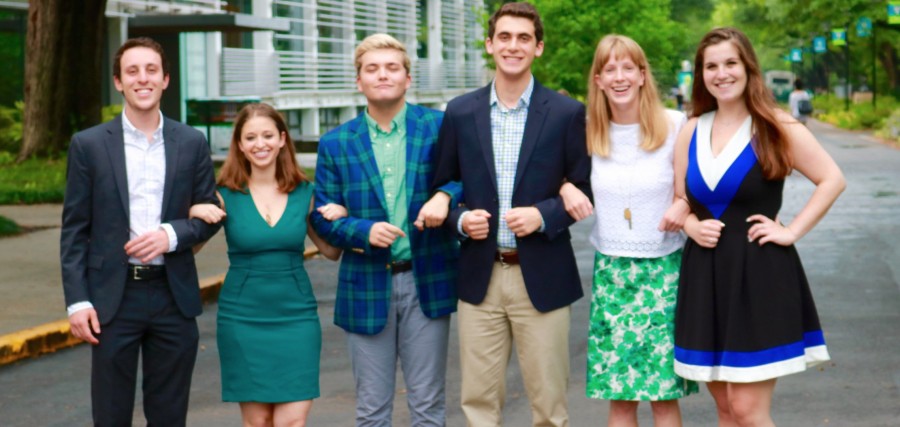USG reflects on progress, shortcomings of 2016-17
More stories from Fiona Grathwohl
Tulane’s Undergraduate Student Government, comprised of more than 70 executive board members, council chairs, cabinet members, student liaisons and senators, worked throughout the 2016-17 academic year both to address its institutional weaknesses and to improve for the future.
One change for USG this year was the development of a new website. With the website came the ability to publish clicker votes, showing how each senator voted on each piece of legislation. The website also produced an outlet for a newsletter that is sent out after every USG meeting with minutes from the meetings and a rundown of upcoming events.
According to former USG president Autumn Gibbons, pieces of legislation in response to current events in the national news such as the proposed Muslim ban were passed. These included legislation allowing international students to stay on campus during breaks and legislation advocating for Tulane to act as a sanctuary campus for students from a variety of different backgrounds.
A USG judiciary system, which will go into effect in the upcoming academic year, was also instituted by the outgoing USG. Students can file a complaint if they believe that USG is violating the bylaws, which will then be reviewed by a panel of justices. This system allows for student engagement in the USG processes without the need to directly contact one of the 39 USG senators.
“It’s like a private review committee to hold us to our bylaws and gives students an avenue for recourse when they want to challenge a decision of USG but aren’t themselves on USG,” Rebecca Lederkramer, former USG vice president of student life, said.
USG worked throughout the past year to initiate reforms in student safety. Led by the student safety committee, USG introduced active-shooter trainings for both semesters in addition to the creation of an event called Coffee with Cops, which is focused on helping students build better relationships with Tulane University Police Department officers over free coffee.
Lederkramer highlighted the increase in student engagement with USG.
“I think that some of the major accomplishments of USG were seeing a huge increase of student engagement in terms of students coming to senate to speak up which was a great thing,” Lederkramer said.
Gibbons felt that she increased transparency through behind-the-scenes work to build relationships with students, administrators and student organizations.
“For me personally, a lot of what I ran on when I was running for president was transparency,” Gibbons said. “So, I did a lot of meeting with student organizations, a lot of meeting with students to explain what was going on so no one ever felt like they were out of the loop.”
Despite accomplishments over the year, the USG team recognizes shortcomings that it hopes incoming USG members will address in the future.
One shortcoming is finances, one of the most influential undertakings of USG, as the senate drafts and approves hundreds of thousands of dollars of funding to student organizations every year.
“I think we are not where we need to be with our finances,” Gibbons said. “I think that the budget is better than it has ever been, and I think that we are making strides towards being a better and more inclusive USG in terms of finance, but I don’t think we are where we should be.”
Additionally, Lederkramer and Gibbons agreed that the senate needs to be more diverse in order to better represent the student body.
“We are not a diverse senate,” Gibbons said. “I don’t think we represent the students well … I think if we represented the students in more areas we would do things more efficiently.”
Rising senior Sam Levin, current USG president and former executive vice president, has advocated for strategies that prioritize efficiency and job training, such as targeted guidance for senators to improve USG’s legislation update process and its accountability.
“Last year one of the things we didn’t do that I think is extremely important is we didn’t train our senators on how to write legislation, we didn’t train our cabinet members on how to be a good cabinet, we didn’t train our council chairs on what it means to be a council chair,” Levin said.
After the recent USG elections, many former senate members are confident about the incoming senate.
“Looking at the roster, I think they are going to be some of the most engaged senators I’ve ever seen on senate,” Levin said. “… They’re eager, they are ready to work and they’re passionate.”
Gibbons agrees that the incoming USG members are the best cohort to date.
“I think that this upcoming senate is going to be the best yet because it is an extremely ambitious crowd, and it makes me extremely happy to see where USG is going,” Gibbons said.
Your donation will support the student journalists of Tulane University. Your contribution will allow us to purchase equipment and cover our annual website hosting costs.



